Counting the days to independence
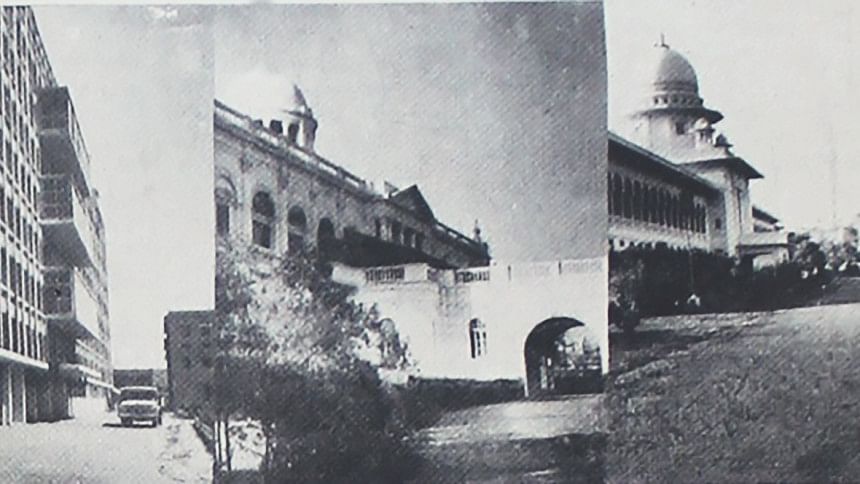
"The struggle this time is for emancipation. The struggle this time is for independence." These historic words rang through the air of Race Course Maidan (now Suhrawardy Udyan) on March 7, 1971, as Bangabandhu Sheikh Mujibur Rahman delivered a speech which is now considered a UNESCO world documentary heritage. The leader laid down four conditions under which the Awami League would attend the National Assembly meeting on March 25: martial law was to be immediately lifted, all military personnel were to be instantly withdrawn, elected representatives of the people were to gain power, and the number of casualties during the conflict were to receive a proper inquiry. The Non-Cooperation Movement was strengthened with his new directives—no taxes would be paid, government servants would only obey his orders, the secretariat, government and semi-government offices and courts in East Pakistan would hold strikes, only local and inter-district telephone lines would function apart from a few exceptions, and railways and ports would not cooperate if used to repress the people of East Pakistan. The days which followed, documented in the timeline below, were a ticking time bomb, as Bengalis prepared to fight for the freedom and independence we revel in today.
March 8, 1971
Dhaka's radio station aired the historic speech by Bangabandhu early at 8:30am, triggering processions of support in both East Pakistan and abroad. Ten thousand Bengalis in Britain assembled in front of the Pakistani High Commission in London demanding the independence of Bangladesh, while Bengalis working in Pakistani International Airlines led a procession from the airport to Bangabandhu's Dhanmondi residence. Chhatra League President Nure Alam Siddiqui, General Secretary Shajahan Siraj, DUCSU Vice-President ASM Abdur Rab and DUCSU General Secretary Abdul Quddus Makhan showed full support, and jointly termed the struggle for independence as the "Freedom Fight," and Bangabandhu as the, "Father of the Nation." At night, the General Secretary of Awami League revealed in a statement that the press note released by military authorities portrayed a completely false and significantly lower number of deaths of innocent civilians fighting for their rights during their crackdown.
March 9, 1971
Abdul Hamid Khan Bhashani made a public address at Paltan Maidan, showing support for the Non-Cooperation Movement, and demanded that Yahya Khan hand over power to the rightful majority winner, Bangabandhu. Air Marshal Asghar Khan demanded the same. Leftist forces in exile formed the Bangladesh Jatiyo Mukti Songram Somonnoy Committee (Bangladesh National Freedom Struggle Organising Committee) in West Bengal, India. Meetings were held at army headquarters in Rawalpindi to apparently figure out how to tackle the ongoing Non-Cooperation Movement.
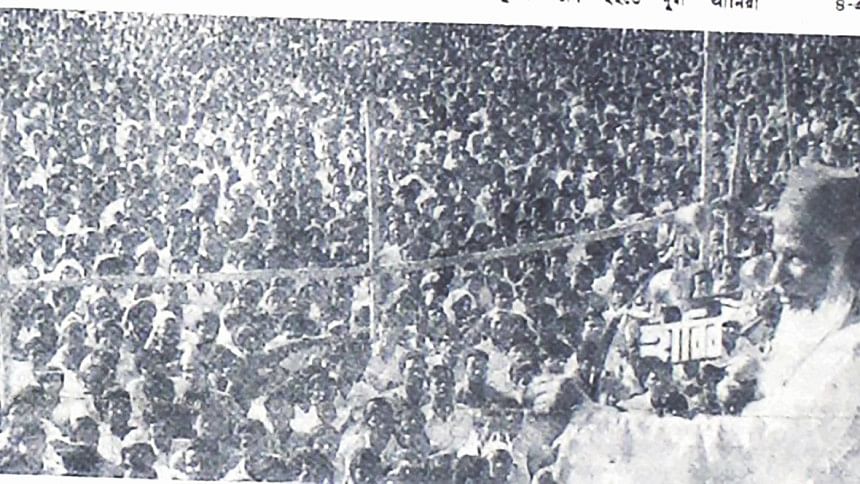
March 10, 1971
Peoples' Party Chairman Zulfikar Ali Bhutto sent a telegram to Bangabandhu, saying that the present state and future of the country were in serious uncertainty, and that they were both responsible for doing whatever was needed to protect the nation. The Non-Cooperation Movement continued in full swing under Bangabandhu's orders, with the Bangladeshi flag bearing our yellow map hoisted over every house, police station, High Court, and Justice residence. According to Air Marshal Asghar Khan, Bangabandhu had become the head of the acting government in Dhaka.
March 11, 1971
The High Court judge and Administrative Secretary, along with many officers across the country, quit their jobs. Protesting civilians began to create obstacles in procurement of necessities by the military authorities; one convoy supplying rations was intercepted by civilians in Sylhet. This led to the enforcement of military order 114 that night, stating that if any civilian willingly or unwillingly harmed government property or hampered military work, they would be punished by law.
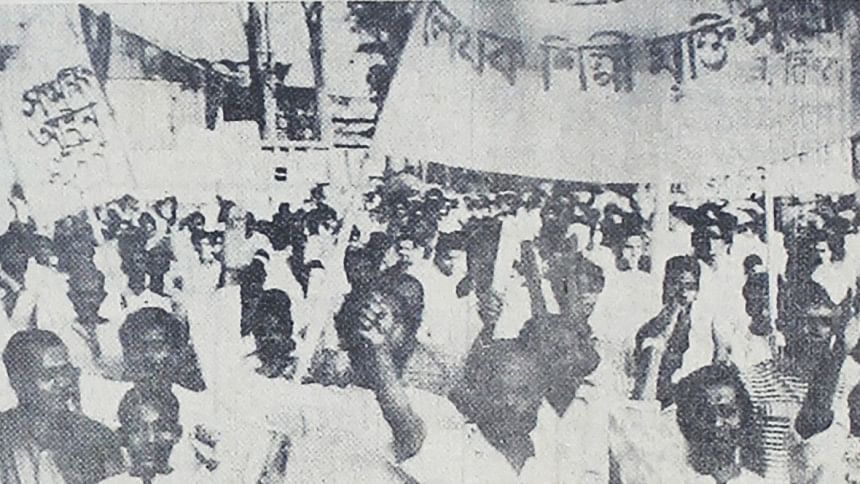
March 12, 1971
Air Marshal Asghar Khan said in a press briefing in Lahore that fate was playing an odd game, where the fault was of Lahore, yet shots were being fired in Dhaka. National Committee member Mohammed Zahiruddin gave up his title, which was given by the Pakistan Government. Twenty-seven prisoners escaped in Bogra; one was killed in open fire while 15 were injured. Influential women, including poet Sufia Kamal, declared full support for Bangabandhu.
March 13, 1971
Military authorities enforced military order 115, which stated all employed civilians had to join the Defence Ministry by 10am on March 15. Failure to do would lead to them being termed as fugitives, and court-martialled. Artist Jainul Abedin gave up the title given to him by the Pakistan Government, in solidarity with the Non-Cooperation Movement. Former National Committee member Afazuddin Fakir asked the Defence Ministry of the East to be coordinated by a Bangladeshi, and all battalions of the Bangladesh Regiment to be managed by Bangladeshi officers.
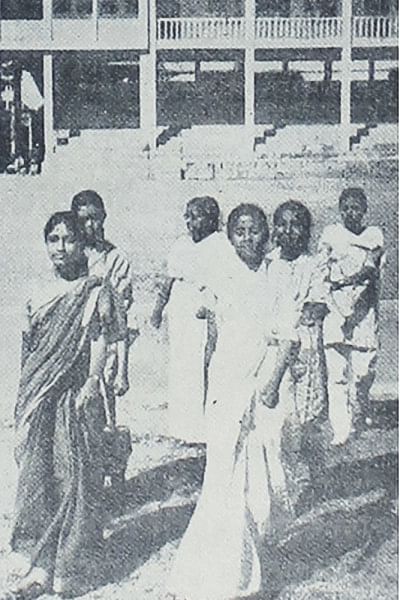
March 14, 1971
This was the last day of the second phase of the Non-Cooperation Movement. National Awami Party leader Abdul Wali Khan and Bangabandhu held a meeting at the latter's residence. Meanwhile, in Nishtar Park, Karachi, Peoples' Party Chairman Zulfikar Ali Bhutto addressed a rally, calling for power to be transferred to the majority parties: The Awami League in East Pakistan, and the People's Party in West Pakistan. He also urged Bangabandhu to sit with him for a dialogue. In a rally in Barisal, National League Chief Ataur Rahman Khan asked Bangabandhu to form a temporary government. Bangabandhu also announced new orders for the Non-Cooperation Movement.
March 15, 1971
Justice Abu Sayeed Chowdhury resigned as Vice Chancellor of Dhaka University, in protest of the killing of two students by the Pakistani army. In the afternoon, President Yahya Khan arrived in Dhaka from Karachi, under tight security, to hold "negotiations" with Bangabandhu. Governor Lieutenant General Tikka Khan had arrived to welcome him at the airport, but no journalists were allowed there. In a press conference in Karachi, Bhutto stated that the Awami League and the Peoples' Party should jointly form a new government. Bangabandhu made an announcement with 35 directives, calling for the continuation of the Non-Cooperation Movement, while introducing a fresh action programme for the third phase.
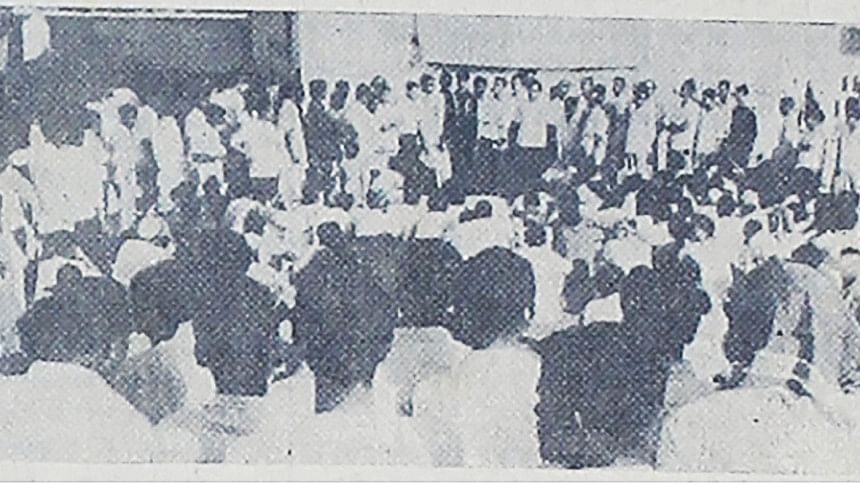
March 16, 1971
Bangabandhu and President Yahya Khan held a closed-door meeting at the President's House (now Bangabhaban) for about an hour, without their advisors. Bangabandhu accused Yahya Khan of committing a grave mistake by ignoring the majority leader and deferring the National Assembly session which was to be held on March 1. Bangabandhu then asked Yahya Khan to avert the national crisis by fulfilling the demands made on March 7. Yahya Khan exclaimed that withdrawing martial law would lead to a constitutional vacuum, and so Bangabandhu sent his advisor, Dr Kamal Hossain, to meet the President's Principal Staff Officer Lt Gen SGMM Peerzada, to work out a solution to this together.
March 17, 1971. This was the 16th day of the Non-Cooperation Movement. At President Yahya Khan's residence, another meeting was held between him and Bangabandhu, which lasted nearly an hour. Yahya Khan called upon Bhutto to arrive in Dhaka. The next meeting between Bangabandhu and Yahya Khan was announced to be held on March 19. That night, trucks of civilians in Tejgaon and Mohakhali came under attack by the military. The innocent civilians were mugged and tortured, infuriating the Bengalis further.
March 18, 1971
The meetings between President Yahya Khan and Bangabandhu were a ruse to distract people as more military personnel poured into East Pakistan. Yahya Khan ordered the army to prepare for an attack on the Awami League leadership, and allowed General Tikka Khan to arrange for an ominous operation which East Pakistan was unaware of. Furthermore, Bangabandhu declined to accept the probe body on recent shootings in various areas of East Pakistan, set up by Martial Law Administrator Zone B Tikka Khan, since the report stated the shootings were carried out "to go into the circumstances which led to the calling of the army in aid of civil administration in various parts of East Pakistan between March 2 and March 9." He then sent a team from Awami League, including Captain Mansur Ali, to make an enquiry about the shootings.
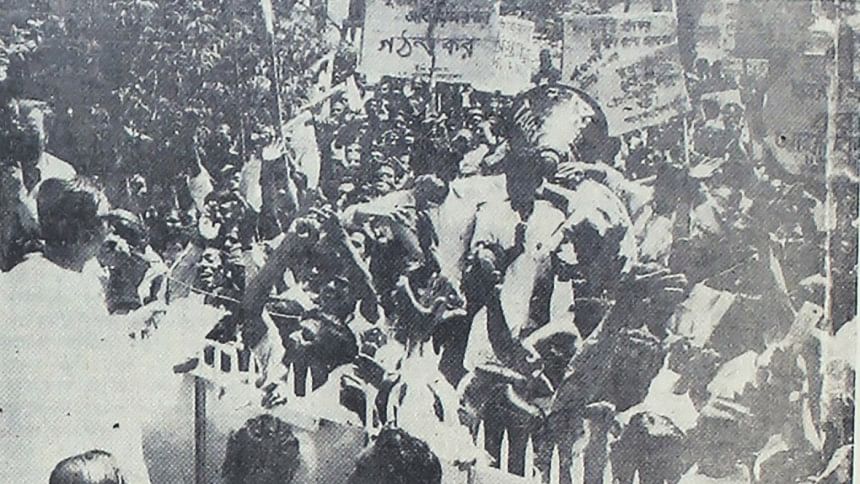
March 19, 1971
This was the 18th day of the Non-Cooperation Movement. Ninety minutes into another meeting between Bangabandhu and President Yahya Khan, news broke out of civilian and military clashes in Tongi, Joydebpur, and other areas. Two civilians were killed, with around 200 injured in the Joydebpur clash, after which a curfew was imposed by the Pakistani authority. Bangabandhu condemned the clashes, and processions were brought out by enraged Bengalis. It was becoming even more evident that these meetings were mere distractions, but Bangabandhu continued the talks, after a break.
March 20, 1971
A fourth meeting between Bangabandhu and Yahya Khan was held, where Syed Nazrul Islam, Tajuddin Ahmad, Khondaker Mostaq Ahmad, Muhammad Mansur Ali and Kamal Hossain were present. Bangabandhu began a heated discussion on the military attack in Joydebpur, but Yahya Khan blamed the civilians for setting up a barricade on the road to prevent a military commander from travelling to Dhaka from Joydebpur. Yahya Khan also urged Bangabandhu to invite Bhutto to Dhaka for negotiations, which he refused.
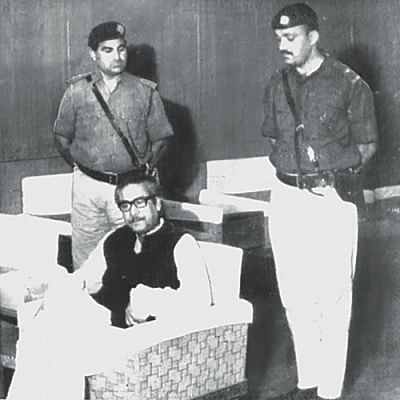
March 21, 1971
Peoples' Party Chairman, Zulfikar Ali Bhutto, arrived in Dhaka on the request of Yahya Khan. Bhutto was brought up to speed on the contents of the meetings between Bangabandhu and Yahya Khan. The junta informed Awami League of a draft proclamation, and sent the party a copy. Awami League found various loopholes in the draft proclamation, and suggested some alterations; one of which was that the proclamation should come into force seven days after being issued, or seven days after five new governors for the provinces had taken the oath of office.
March 22, 1971
Yahya Khan postponed the National Assembly which was to be held on March 25, claiming the need for more unity amongst the leaders. Therefore, the leaders, Bangabandhu, Yahya Khan, and Bhutto, held their sixth meeting. Bangabandhu brought up the enforcement and alterations to the draft proclamation, which Yahya Khan said would not be possible unless Bhutto was also on board. Bhutto stated in a news conference later in the day that he would reach an agreement on the proclamation soon.
March 23, 1971
Instead of the Pakistani flag, the Bangladeshi flag was seen over every house, despite it being Pakistan Resolution Day. Alternatively, Independent Bangladesh's Central Student Agitation Committee and Central Workers Agitation Committee celebrated this day as "Protirodh Dibosh" (Resistance Day). Awami League submitted draft final proposals regarding rightful power transfer. As it became more and more obvious that the Bengalis could no longer tolerate West Pakistan rule, President Yahya Khan suspiciously spent the day in the cantonment instead of in the President's House. Operation Searchlight had been authorised on this very day by Yahya Khan, and preparations had already been made.
March 24, 1971
Mayhem had begun. The Pakistan army surrounded the Saidpur Cantonment and Botlagari, Golahat and Kundul villages. They attacked and killed nearly 100 civilians, and injured 1,000. A battle broke out in front of Rangpur Medical College, and the army shot and killed 50 unarmed civilians in surrounding regions. Curfew was imposed. The nation could not wait any longer. "We don't want any more discussions; now we want an announcement," said Bangabandhu.
March 25, 1971
Bangladesh witnessed the most horrific night in its history. Operation Searchlight had begun in full swing. Yahya Khan quietly left Dhaka in the evening, refusing to listen to Bangabandhu's demands, while leaving behind orders for the most heinous acts. At around 11 pm, the Pakistani army became ruthless. Innocent civilians were mercilessly attacked and killed, helpless women were raped, and countless houses were burned down and looted. Hindu areas were the most heavily attacked. Troops from the 22nd Baloch Regiment attacked Pilkhana EPR, which triggered attacks on the entirety of Dhaka, including Rajarbagh and Shankhari Bazaar. Students and intellectuals of Dhaka University were brutally massacred. After midnight, Pakistani forces infiltrated Bangabandhu's residence and opened fire.
On March 26, at 1:30 am
Bangabandhu was captured and taken to the Sher-e-Bangla military office premises, and later transferred to the cantonment. It was only a matter of time until every Bengali would hear the declaration they had all been waiting for.

 For all latest news, follow The Daily Star's Google News channel.
For all latest news, follow The Daily Star's Google News channel. 



Comments